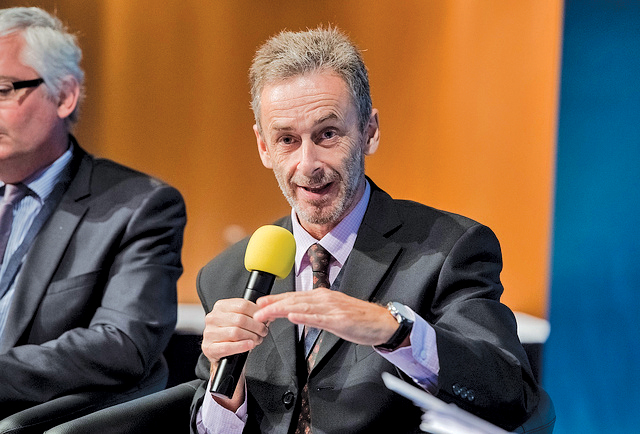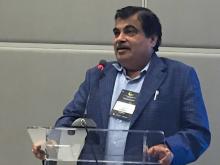Multilateral development banks (MDB) are determined to do all they can to encourage governments of developing countries meet key sustainable transport targets, according to a senior figure at one of the world’s biggest MDB’s. Guy Woodford reports Tyrrell Duncan, Asian Development Bank’s (ADB) director of Transport and Communications Division, East Asia has been at the forefront of MDB efforts to enhance sustainable transport and road safety in developing countries. Speaking during a break in talks at the In

Tyrrell Duncan
RSS943 Asian Development Bank’s (ADB) director of Transport and Communications Division, East Asia has been at the forefront of MDB efforts to enhance sustainable transport and road safety in developing countries. Speaking during a break in talks at the 1102 International Transport Forum 2013 annual summit in Leipzig, Germany, Duncan spoke of the need to tackle “many urgent challenges”, including the need to reduce road congestion in developing countries and make urban transport more accessible to a wider section of the population.
“There are countries like China, Mongolia and Indonesia where there has been rapid urbanisation and cities within them that are becoming congested because not enough thought has been given to transport,” said Duncan.
“There are problems with air pollution, such as those highlighted in Beijing earlier this year, caused by the volume of vehicle emissions. There are also new challenges about using transport to hep countries become more economically competitive.
“Ban Ki-moon [3262 United Nations Secretary-General] set things in motion through the Post-2015 UN Development Agenda. He is setting up six high level panels to deliberate on the key development issues which, for the first time, include sustainable transport. It [sustainable transport] is an issue that the world needs to address.”
At the Rio+20 United Nations Conference in June 2012, thanks to efforts co-ordinated by Duncan, ADB; together with the African Development Bank; CAF – Development Bank of Latin America; European Bank for Reconstruction and Development; European Investment Bank; Inter-American Development Bank; Islamic Development Bank; and World Bank agreed a US$175 billion voluntary commitment to help create sustainable transport systems in developing countries.
Duncan said encouraging developing countries to use good road asset management systems and spend more on road maintenance was one of the key focuses of ADB and other MDBs. He said one specific ADB-proposed project to improve road asset management systems in China’s Yunnan province is going to the ADB board in the next couple of months.
Of the need for better road safety in developing countries, Duncan said, “It’s an area we treat very seriously. The levels of fatalities that have been highlighted in the United Nations3439 Decade of Action for Road Safety show the need for action.
Governments [in developing countries] have envisaged an important role for multilateral development banks and international agencies.
“The full scale of investment needed to achieve the Decade of Action was not estimated when the countries signed to it. The scale is colossal. One estimate prepared by the people of IRAP (International Road Assessment Programme) based on the star rating methodology is that if you take it that infrastructure investment is 30% of reducing road accidents, with vehicle safety improvement and behavioural factors the remaining percentage, the cost to achieve The Decade of Action in developing countries is US$315 billion.”
Duncan said that the “quite daunting” IRAP estimated figure to meet all targets laid down in the UN Decade of Action for Road Safety went beyond what MDBs could provide.
“It means that the task of improving road safety infrastructure sits squarely with governments,” added Duncan. “Countries have to have the will to do this. We can play a role in this, particularly as many countries have not established a very strong role for road safety. In many developing countries, there might not yet be conviction that high [financial] returns can be gained from improving road safety. We have always understood and reinforced the point that it’s ‘their countries’ and a government’s own actions will have the biggest influence.”
MDBs such as ADB, said Duncan, are keen to spread details of best practice on road safety coupled with providing support for increasing investment to help developing countries improve their road death and injury records.
The International Transport Forum at the OECD (3685 Organisation for Economic Co-operation and Development) is an intergovernmental organisation with 54 member countries. It acts as a strategic think tank for transport policy and organises an Annual Summit of ministers.
Duncan was a panellist in a session titled Making Better Choices: Assessing Transport Investments during the recent ITF 2013 summit in Leipzig.
The summit saw ministers from ITF member countries make a joint Declaration on Funding Transport calling for more investment in strategic transport infrastructure and services.RSS
Multilateral development banks (MDB) are determined to do all they can to encourage governments of developing countries meet key sustainable transport targets, according to a senior figure at one of the world’s biggest MDB’s. Guy Woodford reports
Tyrrell Duncan,“There are countries like China, Mongolia and Indonesia where there has been rapid urbanisation and cities within them that are becoming congested because not enough thought has been given to transport,” said Duncan.
“There are problems with air pollution, such as those highlighted in Beijing earlier this year, caused by the volume of vehicle emissions. There are also new challenges about using transport to hep countries become more economically competitive.
“Ban Ki-moon [
At the Rio+20 United Nations Conference in June 2012, thanks to efforts co-ordinated by Duncan, ADB; together with the African Development Bank; CAF – Development Bank of Latin America; European Bank for Reconstruction and Development; European Investment Bank; Inter-American Development Bank; Islamic Development Bank; and World Bank agreed a US$175 billion voluntary commitment to help create sustainable transport systems in developing countries.
Duncan said encouraging developing countries to use good road asset management systems and spend more on road maintenance was one of the key focuses of ADB and other MDBs. He said one specific ADB-proposed project to improve road asset management systems in China’s Yunnan province is going to the ADB board in the next couple of months.
Of the need for better road safety in developing countries, Duncan said, “It’s an area we treat very seriously. The levels of fatalities that have been highlighted in the United Nations
Governments [in developing countries] have envisaged an important role for multilateral development banks and international agencies.
“The full scale of investment needed to achieve the Decade of Action was not estimated when the countries signed to it. The scale is colossal. One estimate prepared by the people of IRAP (International Road Assessment Programme) based on the star rating methodology is that if you take it that infrastructure investment is 30% of reducing road accidents, with vehicle safety improvement and behavioural factors the remaining percentage, the cost to achieve The Decade of Action in developing countries is US$315 billion.”
Duncan said that the “quite daunting” IRAP estimated figure to meet all targets laid down in the UN Decade of Action for Road Safety went beyond what MDBs could provide.
“It means that the task of improving road safety infrastructure sits squarely with governments,” added Duncan. “Countries have to have the will to do this. We can play a role in this, particularly as many countries have not established a very strong role for road safety. In many developing countries, there might not yet be conviction that high [financial] returns can be gained from improving road safety. We have always understood and reinforced the point that it’s ‘their countries’ and a government’s own actions will have the biggest influence.”
MDBs such as ADB, said Duncan, are keen to spread details of best practice on road safety coupled with providing support for increasing investment to help developing countries improve their road death and injury records.
The International Transport Forum at the OECD (
Duncan was a panellist in a session titled Making Better Choices: Assessing Transport Investments during the recent ITF 2013 summit in Leipzig.
The summit saw ministers from ITF member countries make a joint Declaration on Funding Transport calling for more investment in strategic transport infrastructure and services.RSS





